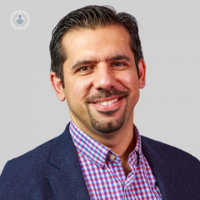Tooth whitening: is it safe?
Autore:Whether it’s from the use of DIY teeth whitening strips, toothpaste or a blue light home kit, it seems that everyone is looking for a way to get that brighter and whiter smile. We’ve asked one of our top dentists Mr Jay Padayachy whether teeth whitening does more harm than good to your tooth enamel and why it’s best to get it done by a professional instead.

What age is it safe for someone to whiten their teeth?
In the UK no-one under the age of 18 may undergo tooth whitening, although this does depend on individual circumstances. Exceptions for those under 18 might be if they have very discoloured teeth which may cause a psychological issue.
Does teeth whitening damage the enamel?
Tooth whitening carried out by a dental professional is totally safe as they are aware of the circumstances when it would not be appropriate to carry out the procedure, as there may be a risk of permanent damage to the teeth or gums.
Tooth whitening does not damage the enamel in the concentrations recommended by the dentist. Some whitening kits bought over the internet may damage enamel as they could be too acidic and will dissolve away the enamel, unlike professionally produced gels available from your dentist.
How often is it possible to have your teeth whitened? Is there a limit?
Whitening is not permanent. Once your desired whiteness has been achieved top-ups may be required to maintain that colour. Depending on your diet, drinking black coffee, dark drinks and smoking may mean you have to do top-ups more often. Top-ups usually only need to be done for a day or two every few months rather than a full course of treatment again.
To maintain the colour good oral hygiene also plays an important role. Brush your teeth twice a day, floss and use interdental brushes as appropriate to remove plaque. Using a whitening toothpaste a couple of times a week can also keep staining to a minimum.
Why is better to have it done professionally than with a home kit?
Only dental professionals registered with the General Dental Council can whiten your teeth, which includes dentists, dental hygienists and dental therapists.
Tooth whitening carried out by beauticians and in whitening kiosks is illegal. It is also illegal to supply whitening materials containing more than 0.1% hydrogen peroxide to anyone other than a dentist or direct to the public.
The regulations are in place so that the person carrying out whitening is properly trained and has the right skills and knowledge to carry out the procedure without risking permanent damage to the soft or hard tissues (teeth and gums).
Is it safe overall?
Yes, tooth whitening is the safest, least invasive cosmetic dental procedure when conducted properly. It should, however, be borne in mind the procedure can lead to temporary sensitivity to temperature, touch and pressure, as well as temporary gum irritation if too much gel is used.
Do not hesitate to book an appointment with Dr Padayachy for any restorative or cosmetic dentistry needs, from teeth whitening to tooth restoration work.


